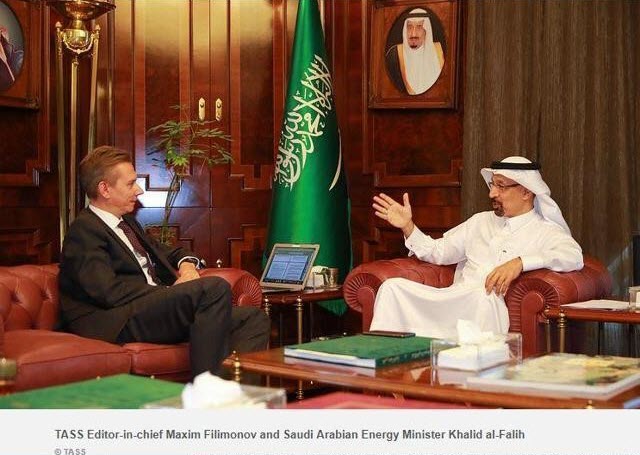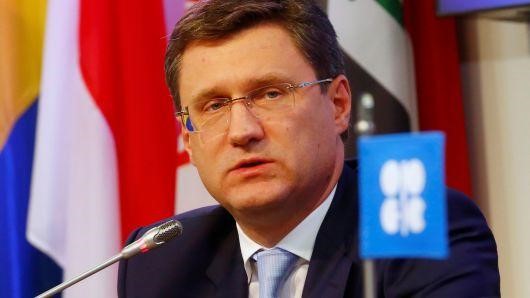For over a year, OPEC General Secretary Mohammed Barkindo has been trying to "institutionalize" the OPEC+ arrangement that includes Russia. At the Oil and Money conference in October 2017 in London, Barkindo told reporters. "This platform of 24 countries, now hopefully growing, should be institutionalized."

Source: OPEC
In September, he said, "What we are working on now is to make it [cooperation] more permanent and institutionalize the framework. Our target is to have a longer cooperation framework in place by December when we reconvene in Vienna [for the next OPEC meeting]."
In an interview with TASS on October 22nd, Saudi Energy Minister Khalid Al-Falih explained his view for the long-term agreement he wanted in December:
"We want to sign a new cooperation agreement that is open-ended. That does not expire after 2020 or 2021. We will leave it open. And what we would like to do is continue for OPEC and non-OPEC to work together. And the difference is that there will be no fixed term for the agreement, which allows us to bring production up or down. It should not have fixed production target. But it allows us to perform regular coordination and sharing information on what are our views on the market, supply and demand, how healthy the market is, what kind of intervention we need, if any, and when."

And in the press release following the meeting with non-OPEC producers on December 7th, OPEC wrote:
"The Meeting emphasized the support and commitment of all participating countries in the 'Declaration of Cooperation' to build on the success achieved thus far, through further institutionalizing the framework for regular and lasting cooperation under the draft Charter of Cooperation between Oil Producing Countries, which was endorsed in principle and to be finalized and ratified by the participating countries." (emphasis added)
But Russian energy minister Alexander Novak said on December 28th that "There is a consensus that there will be no such organization. That's because it requires additional bureaucratic brouhaha in relation to financing, cartel, with the U.S. side." He was reportedly referring to the potential to expose non-OPEC producers to U.S. sanctions if it joined with the cartel.

Source: Reuters
On December 18th, Barkindo delivered a speech titled, "OPEC and Its Role in Oil Market Stabilization," in Angola. Barkindo emphasized the level of "cooperation" that OPEC was able to obtain with the non-OPEC producers.
But such "cooperation" is known as collusion under the Sherman Antitrust Act. Attempting to stabilizing prices is strictly forbidden. At a hearing on May 18th, House Judiciary Committee Chairman Bob Goodlatte (R-Va.) stated:
"As the Supreme Court has explained, '[u]nder the Sherman Act, a combination formed for the purpose and with the effect of... stabilizing the price of a commodity in interstate or foreign commerce is illegal per se.' OPEC's organizational document, under the heading "[o]bjectives," states that the "[o]rganization shall devise ways and means of ensuring the stabilization of prices in international oil markets."
When the OPEC and non-OPEC cuts totaling 1.2 million barrels per day were announced on December 7th, OPEC did not publish a table detailing the cuts by each country. In November 2016, it had published the detailed cuts.
On December 20th, 2018, Reuters reported that Barkindo had written to OPEC members and non-members, "In the interests of openness and transparency, and to support market sentiment and confidence, it is vital to make these production adjustments publicly available. I would urge Your Excellencies to kindly make positive announcements reinstating your countries' commitment to implementing the agreed decisions. This is also vital to underpin trust in our decisions and to buttress ourselves from any naysayers who may doubt our commitment."
OPEC was expected to announce the cuts by December 21st, but no cuts have been reported beyond Saudi Arabia and Russia. This raises the question of what commitments the non-OPEC producers had actually made and whether the 400,000 b/d number will be met. Alternatively, it could mean that the non-OPEC countries do not want to announce publicly that they are colluding, as interpreted under U.S. law.
Conclusions
OPEC's hope to expand its control over global oil markets by "institutionalizing" the Declaration of Cooperation has failed. And the commitments by non-OPEC producers, other than Russia, for 2019 appear on shaky ground. For Russia's part, Novak has said that it is difficult for them to cut output fast in the winter months. The lack of a table showing country-by-country output cuts implies a lack of commitment for now and probably for the future.
Check back to see my next post!
Best,
Robert Boslego
INO.com Contributor - Energies
Disclosure: This contributor does not own any stocks mentioned in this article. This article is the opinion of the contributor themselves. The above is a matter of opinion provided for general information purposes only and is not intended as investment advice. This contributor is not receiving compensation (other than from INO.com) for their opinion.
